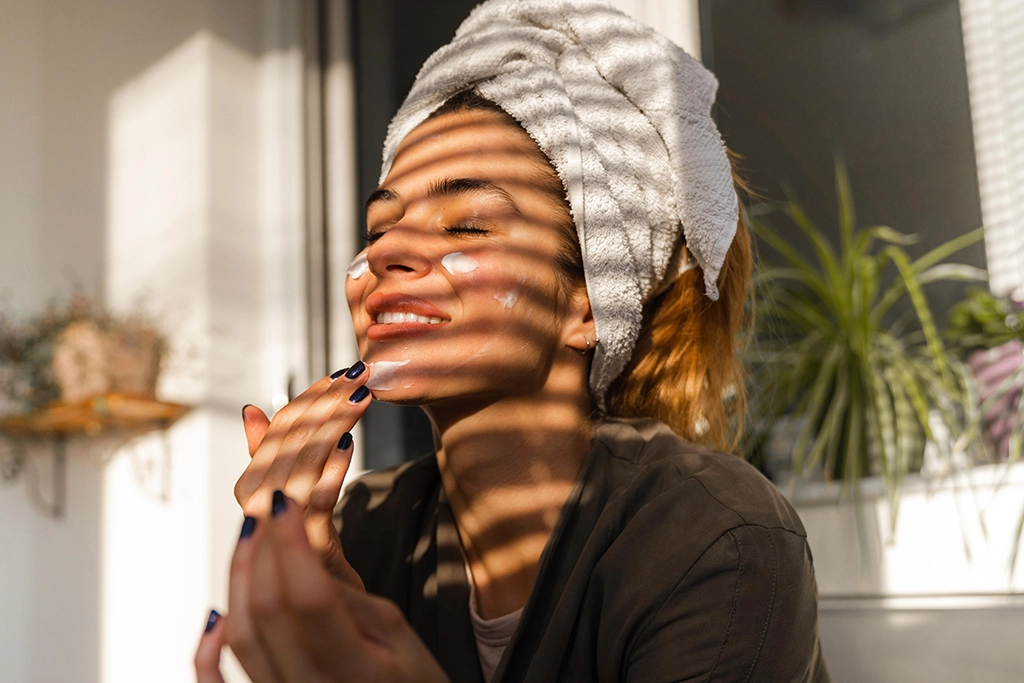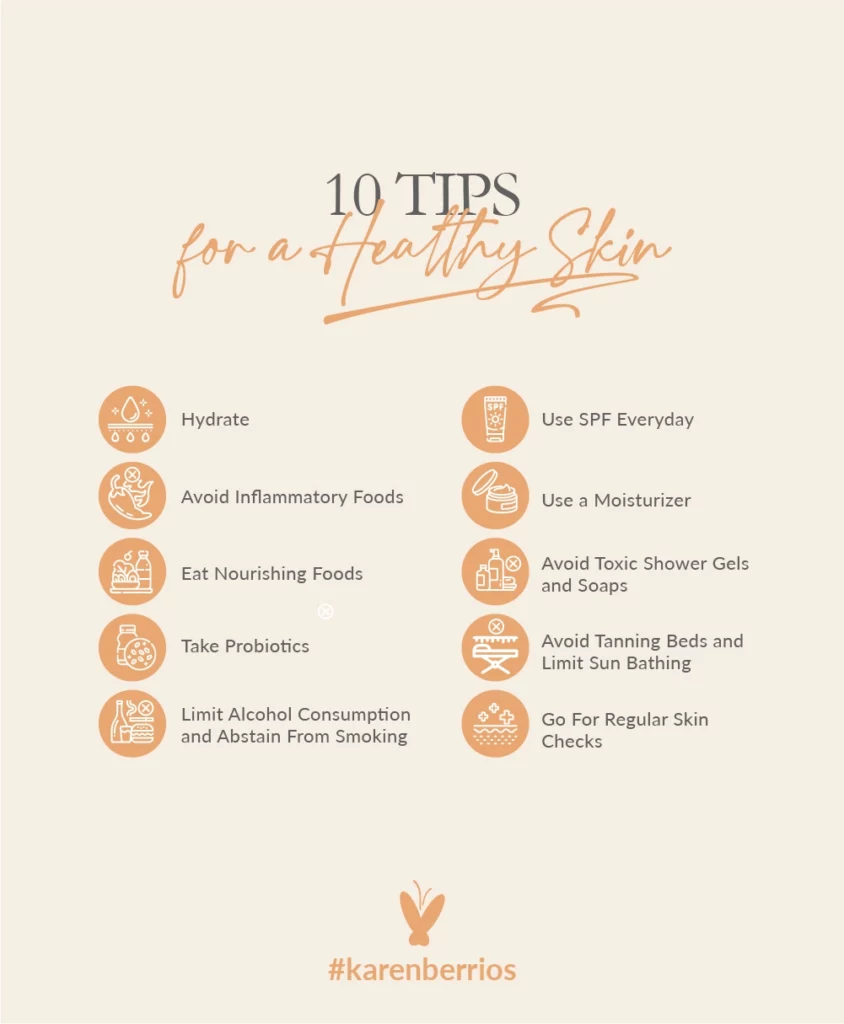

10 Tips for a Healthy Skin
Healthy Skin. The look of your skin can say a lot about your health as it’s your body’s only barrier between the outside world and your flesh and bones. It’s a resilient barrier, to say the least, but it’s not bulletproof.
Toxins we encounter on a daily basis can do irreparable damage to your skin and with it, cross the barrier and infect your blood, organs, and tissues. Some of these toxins are purely environmental and they’re sometimes hard to protect from, but many of them can be regulated and avoided by abstaining from certain inflammatory foods or harmful lifestyle practices that can seriously damage the skin and increase the risk of further health complications and disease development.
Our skin is our largest organ, with a large multitude of functions it performs on a daily basis. It’s created from two major layers, the dermis and the epidermis which are separated by a membrane. The role of our skin is vast, from literal protection from the outside world and immune function to regulating our body’s temperature and providing the sense of touch. The inability to nourish and protect the health of your skin creates damage on a cellular level and it’s completely different than wounds or injuries. It’s therefore extremely important to implement tips to protect your skin and keep it healthy so it can perform all of its important functions in an optimal way.
1. Hydrate
Proper hydration is the ultimate key to keeping your skin healthy and moisturized. Our bodies are made of 70% water and if we’re unable to maintain an adequate level of hydration, it can easily damage and show on your skin. Your skin begins to appear duller, wrinkles and pores become more prominent, and it loses elasticity and plumpness, making it more prone to blemishes, breakouts, and irritations. Drink at least eight to 10 cups of water a day, preferably more if the weather is hot or you’re increasing your level of physical activity, and keep your skin hydrated.
2. Avoid Inflammatory Foods
We all know that highly processed foods and excess sugar consumption are bad for our health, but they can be particularly bad for your skin, causing inflammation and breakouts that can lead to serious health complications down the road. Sugar speeds up the aging process and increases the risk of developing acne and rosacea, especially through its ability to bind to collagen, also known as glycation.
3. Eat Nourishing Foods
On the other side of the coin from avoiding processed foods and sugar, you have plenty of nourishing foods that support skin health through a plethora of vitamins, minerals, antioxidants, and other powerful plant compounds that reduce inflammation, help fight the harmful free radicals, and strengthen your immune system so it’s ready to deal with whatever toxin or pathogen comes along. Antioxidants, in particular, have a powerful impact on reducing inflammation and promoting healthy skin. They fight free radicals and prevent their oxidative damage effect on skin cells.
4. Take Probiotics
Probiotics are one of the most important supplements you can be taking for your skin health as well as your digestion and immune health. They promote the growth of healthy gut bacteria, helping you achieve the optimal levels so that they can balance our the bad bacteria. They are also known to treat acne, eczema, dermatitis, allergic skin reactions, and more.
Before getting the first bottle you see on the shelf, it’s recommended you do a gut microbiome testing so you know what the snapshot of your gut actually looks like. That way, you’ll know exactly what you’re missing out on and how to replenish it.
5. Limit Alcohol Consumption and Abstain From Smoking
Alcohol and smoking are detrimental to the health of your skin. They both cause inflammation and speed up the aging process. Free radicals that are produced by smoking damage the elasticity and collagen production in your skin cells, leading to premature aging and wrinkle formation. Alcohol impairs the skin’s antioxidant defense system and causes dilated facial capillaries. Both of these factors contribute to saggy eyelids, acne, uneven skin tone, and puffiness. Limiting or better, abstaining from the consumption of both will significantly improve your skin’s ability to fight off toxins and repair any damage that’s been induced upon its two layers.
6. Use SPF Everyday
SPF, also known as the sun protection factor is one of the biggest contributors to healthy skin. It’s the greatest protection against skin cancer and precancers, with studies showing a 40% decrease in squamous cell carcinoma development when using SPF 15 on a daily basis. Additionally, it helps prevent the premature formation of wrinkles and dark age spots. And even though it goes without saying that using SPF is a necessary part of the skincare routine during summer, research now proves how it’s important to use sunscreen on a daily basis, every day of the year as the sun’s rays are harmful even through the winter clouds. And don’t focus only on the most critical spots, cover every exposed part of your body!
7. Use a Moisturizer
A good quality daily moisturizer will help keep the level of moisture locked in your skin and prevent it from drying out. It’s important to choose a brand with all-natural ingredients and no toxic additives. Since most skincare products aren’t FDA-regulated, reading the ingredient label might seem overwhelming, making it easy to purchase something with not-the-cleanest ingredients. Go for 100% organic, 100% natural, mineral ingredients and avoid parabens, phtalates, and other hard-to-pronounce additives.
8. Avoid Toxic Shower Gels and Soaps
In addition to choosing an organic and all-natural moisturizer, it’s important to keep non-toxic shower gels and soaps as parts of your regular skincare routine. These products can have harmful ingredients that can be seriously detrimental to your health, encouraging inflammation and even causing skin cancer.
9. Avoid Tanning Beds and Limit Sun Bathing
Even with a great SPF slathered on your skin, the harmful UV rays are still able to penetrate through your skin and cause cellular damage. If you’re tanning naturally, minimize the time your spend outside, but if you’re someone who frequents tanning beds, this is your time to stop. Tanning beds have been linked to an increased risk of cancer, premature skin aging, burns, and even increase the appearance of stretch marks and wrinkles.
10. Go For Regular Skin Checks
No matter how well you take care of your skin, there’s always a possibility of a mole turning into a precancerous or cancerous growth. Visit your dermatologist on a regular basis and let them take a snapshot of your entire skin, tracking the areas they believe could potentially turn into something over time. And when your dermatologist suggests you take out a mole, you do it. No questions asked. It’s always better to prevent any suspicious mole from changing than increase the risk of getting skin cancer.

Final Thoughts
Healthy skin is plump, hydrated, glowing, and nourished with nutrients from whole foods and healthy lifestyle routines. Pay attention to your skin as it will show you when something is wrong or needs to be changed.

hey there
I'm Karen!
I have found my cancer journey to be a positive and profound transformational experience. I’m inspired to share my healing journey here, and trust you’ll find hope, encouragement and purpose as you discover the healing power that lies within you.
Join
The Mailing List!
By signing up for my newsletter, you agree with our Privacy Policy and Terms & Conditions.


